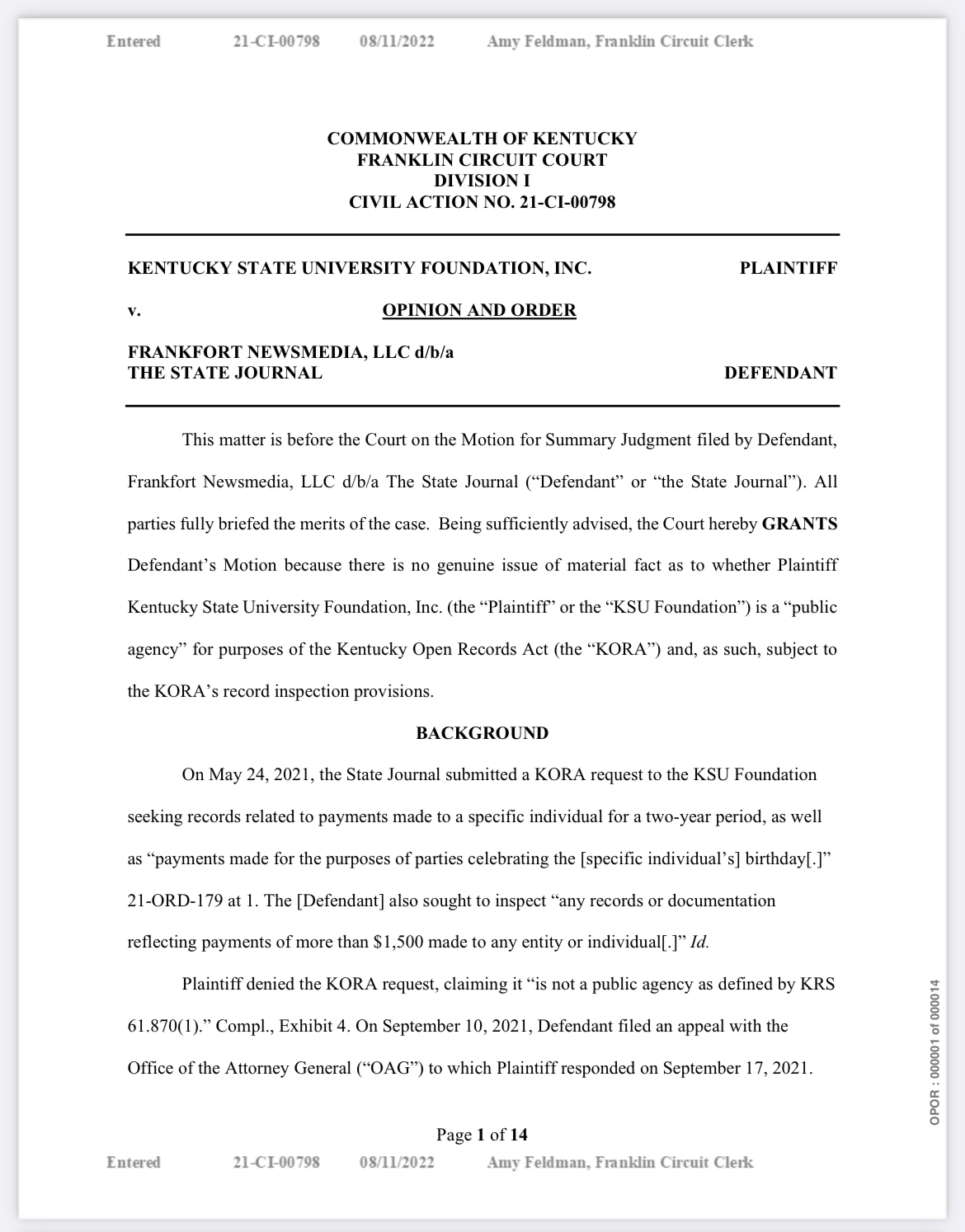
The Franklin Circuit Court ruled today that the Kentucky State University Foundation is a public agency and subject to the requirements of the open records law.
https://bloximages.newyork1.vip.townnews.com/state-journal.com/content/…
The undisputed victor in the case, The State Journal, was hauled into court by the foundation in 2021, after it received a decision from the Kentucky Attorney General affirming its right of access to foundation records.
https://ag.ky.gov/Resources/orom/2021/21-ORD-179.pdf
As an “arm of KSU [that exists solely] for the purpose of fundraising and support of KSU’s students, faculty, programs and mission,” the court opined, the foundation is accountable to the public through its records.
https://www.state-journal.com/education/judge-sides-with-newspaper-in-k…
This affirms a 1992 Kentucky Supreme Court opinion that reached the same result and that the foundation had spent decades trying to evade.
https://casetext.com/case/frankfort-pub-v-kentucky-st-un-found
“If the principal (KSU) is subject to the Open Records Act,” Judge Phillip Shepherd reasoned, “then the agent (KSU Foundation) must also be subject to the Open Records Act.”
Were it otherwise, the court continued, “the plain requirements of the Open Records Act would be ridiculously easy to circumvent, the stewardship of funds held in trust for a public university would be shielded from public scrutiny, and the purpose of the Open Records Act would be completely thwarted.”
Today’s opinion concludes an open records dispute that began amidst the 2021 financial crisis and resulting controversy associated with former KSU President Christopher Brown.
In May 2021, State Journal reporter Austin Horn requested records related to payments made to a then President Brown for a two-year period, “payments made for the purposes of parties celebrating” Brown’s birthday, and records “reflecting payments of more than $1,500 made to any entity or individual[.]”
The State Journal relied on the 1992 opinion involving the same parties — the KSU Foundation and the State Journal — as well as subsequent legal authority affirming that opinion in the strongest possible terms, in asserting its right of access to foundation records.
The foundation nevertheless denied Horn’s request, claiming that it “is not a public agency as defined by [the open records law.]” It’s chief argument was, in essence, that in the years following the Kentucky Supreme Court’s 1992 opinion, it retrofitted the foundation — moving it off campus and reconstituting its board of directors, for example — to avoid the application of the statute as construed in by the Supreme Court.
Representing the State Journal, Dinsmore & Shohl attorneys Jeremy Rogers and Suzanne Marino persuaded the Franklin Circuit Court that the KSU Foundation “exists to further the mission of KSU, and to implement policies that support KSU, its students and programs. It has no other reason for existence. So long as the KSU Foundation has the primary purpose of supporting KSU, and it holds and distributes its funds for the sole benefit of KSU, it must be ‘an agency thereof’ for purposes of
the Open Records Act.”
The court rejected the KSU Foundation’s transparent attempt to have it both ways by publicly holding itself out as a fundraising arm of the university while quietly trying to legally distance itself from the university.
“Support of KSU and its mission is the sole reason for the Foundation’s existence. Its operations are inextricably intertwined with the University. As the Kentucky Supreme Court noted in the [Cape Publications, Inc. v.] University of Louisville Foundation case, “[t]he public has a legitimate interest in the functions of the Foundation. [T]he Foundation and the University essentially act as one and the same, and that the Foundation was established, created, and wholly controlled by the University. As a public institution that receives taxpayer dollars, the public certainly has an
interest in the operation and administration of the University.”
https://caselaw.findlaw.com/ky-supreme-court/1439464.html
This is a clear victory for open government in Kentucky made possible, in part, through the efforts of Kentucky Open Government Coalition co-directors Austin Horn and Jeremy Rogers.
Judge Shepherd concluded his opinion by ordering the KSU Foundation to produce records responsive to Horn’s original request within ten days.
Will the KSU Foundation squander more public funds on an appeal of the Franklin Circuit Court’s well-reasoned opinion — an opinion based on unassailable legal precedent and salutary public policy aimed at securing public trust — to the appellate courts?


